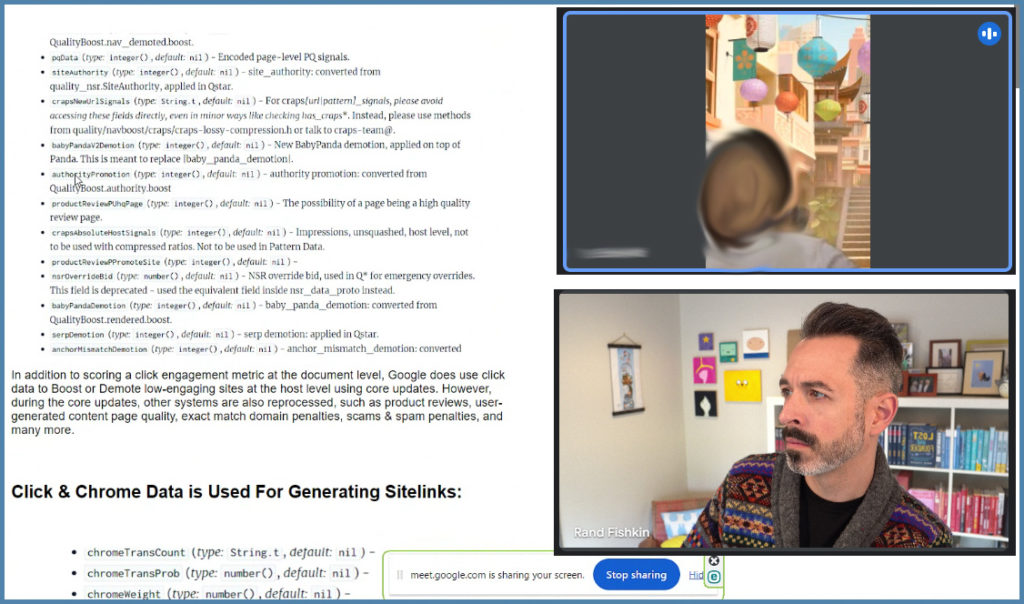- The Solo Founder Newsletter
- Posts
- 📰 [BREAKING] Leaked Google Search API Documents. Everyone in SEO Should See Them
📰 [BREAKING] Leaked Google Search API Documents. Everyone in SEO Should See Them
Secrets from the Algorithm.
Just… wow.
I don’t often put news pieces in here, because well, they are often useless. But this is a very important article for pretty much all of us who’s looking to get something out of Google Searches, so here it is.
Some highlights:
- My anonymous source claimed that way back in 2005, Google wanted the full clickstream of billions of Internet users, and with Chrome, they’ve now got it. The API documents suggest Google calculates several types of metrics that can be called using Chrome views related to both individual pages and entire domains.
- A module on “Good Quality Travel Sites” would lead reasonable readers to conclude that a whitelist exists for Google in the travel sector (unclear if this is exclusively for Google’s “Travel” search tab, or web search more broadly). References in several places to flags for “isCovidLocalAuthority” and “isElectionAuthority” further suggests that Google is whitelisting particular domains that are appropriate to show for highly controversial of potentially problematic queries.
- Google has numerous ways to identify entities, sort, rank, filter, and employ them. Entities include brands (brand names, their official websites, associated social accounts, etc.), and as we’ve seen in our clickstream research with Datos, they’ve been on an inexorable path toward exclusively ranking and sending traffic to big, powerful brands that dominate the web > small, independent sites and businesses.
- As Mike noted in his article, there is documentation in the leak suggesting Google can identify authors and treats them as entities in the system. Building up one’s influence as an author online may indeed lead to ranking benefits in Google. But what exactly in the ranking systems makes up “E-E-A-T” and how powerful those elements are is an open question. I’m a bit worried that E-E-A-T is 80% propaganda, 20% substance. There are plenty of powerful brands that rank remarkably well in Google and have very little experience, expertise, authoritativeness, or trustworthiness
- Classic ranking factors: PageRank, anchors (topical PageRank based on the anchor text of the link), and text-matching have been waning in importance for years. But Page Titles are still quite important.
- For most small and medium businesses and newer creators/publishers, SEO is likely to show poor returns until you’ve established credibility, navigational demand, and a strong reputation among a sizable audience.
Well, I think most of us are probably surprised, but not really at the same time. These are pretty much open secrets in the SEO industry.
It’s why I treat SEO as a bonus and probably not the first, second, or even third choice when marketing something. People who tell you that you HAVE to do SEO probably have either a course or a service to sell you.
I’m always hesitant to say “just”, because it’s reductive. In this case though, “just” follow the best internal SEO practices is probably the most efficient way to do SEO.
When you get popular, then you might get to use SEO as a real channel.
Some additional readings:
And now back to our regular schedule.
📰 In today’s pick…
Cool stuff
Excerpt:
Aloha Product Hunt!
We’re excited to launch iki.ai - an intelligent knowledge interface for professionals & teams
Why? We’re overloaded with information – posts on Linkedin, links shared in chats, tens of open tabs when you dive into some topic, YouTube videos & webinars that you postpone watching, PDFs you never read through.
And there is no wiki for your professional knowledge, the most valuable intellectual asset you possess.
LLMs are the new interface to information, capable of its transformation according to a request – the capability that only human experts had before.
Solution
Facing the problem ourselves, we’ve built a collaborative LLM-powered digital library, featuring:
knowledge upload in multiple formatsa co-pilot aware of all the information inside any document, helping you to fetch it, answer questions, conduct analytics, and write textsan embedded reader to open almost any content inside ikiweb search to augment your researchcreate collections on different topics and share them with people along with an embedded assistant - it’s like creating a custom GPT in an interfacea huge internal index to search in, comprised of curated public knowledgerelated materials for a piece of contentcommunity of peers to exchange knowledge
Producthunt
Miscellaneous
Excerpt:
Every “overnight success” is the result of years of thankless work. Success comes not from great acts of genius but from doing lots of small things consistently.
Failure is a mark of courage. It means you risked failure.
In the long run, a lazy lifestyle creates more work and stress than a disciplined one.
Don’t create the content you think people want to consume, create the content you want to consume. If it interests you, you’ll make it interesting to others.
Don’t take yourself seriously, but do take your work seriously. Do what you say you’re going to do. If you don’t, you’ll lose respect for yourself. And if you don’t respect yourself, you’ll find it effortless to trespass across your own boundaries and violate all that you value.
Marketing
Excerpt:
Putting this into practice may seem straight forward, and you may be reading this thinking ‘but, I already do that’ — well if you take a look at one of your ads right now, with those 5 stages in mind, you’ll likely see a significant gap between points.
And what’s important to remember is, if any of those points are weak, your brand positioning is weak — resulting in a breakdown in communication between your ad and your potential customer.
Okay, so how exactly did we use this methodology to generate over $100,000 in sales?
The first step was to turn off all ads and start again.
We redesigned everything.
New copy, defined new USPs, new tone of voice, new images.
But for us, what was most important was to first understand what differentiated the products that we were selling, from their direct competitors so that we could effectively communicate this when considering point number 3 above.
We spent a week drafting ads, editing, refining, until we had a completely different ad that the ones we were originally running. After we made the new ads live, the results were immediate.
There is one question that has been asked by designers and their marketing counterparts since the dawn of advertising; ‘what drives the customer to buy — logic or emotion?’.
Well, it’s both, if you use a clearly defined methodology you can tap into logic and emotion, allowing you to maximise sales.
r/marketing
Marketing
Excerpt:
More than a century ago, a soda company decided to offer a never-before-seen product: the first-ever cola drink. In doing so, it successfully positioned itself as the original. Now, Coca-Cola benefits from millions of sales worldwide and is a household staple. It's positioned in our minds as the gold standard of soda.
Brand positioning allows a company to differentiate itself from competitors. This differentiation helps a business increase brand awareness, communicate value, and justify pricing — all impacting its bottom line.
And, you have a reputation whether you cultivate it or not, so you might as well create a brand positioning plan to help you control your reputation and brand image.
Jigar Thakker, Chief Business Officer at INSIDEA, seconds this, as he told me that brand positioning is bridging the gap between what customers need and the unique solution you offer that fulfills them. He says, “It [brand positioning] cements how your product or service stands out and ultimately wins over customers. It helps your target market identify your brand and understand why you are the best choice and the leader in your market.”
But, not all brand positioning strategies are the same or have the same objective. Your positioning and messaging will vary depending on the nature of your offering and industry.
Below, I’ll review a few common positioning strategies to help you get started.
Hubspot
Marketing
Excerpt:
The bad
1/ Misinformation: Examples of AIOs contaminated with misinformation or questionable answers are easy to find. It's clear that Google tolerates some degree of misinformation or poor results. Of course, Google needs to fix misinformation as fast as possible, especially in sensitive areas like health or law. But AIOs also magnify an uncomfortable fact: the web has been full of misinformation for a while. Consensus is easier for some topics than others. I do have hope that AI, in general, makes it easier to identify misinformation.
We’re also facing a denominator trap in the debate about how much wrong information is ok: we don't know how many AIOs deliver correct vs. factually wrong results. It might just be a tiny fraction but misinformation sticks out like a sore thumb. The same is true for good vs. bad experiences with AIOs. There is a chance the absolute majority of experiences are good.
2/ Traffic loss: Travel sites, publishers and affiliates will suffer from the launch of AIOs. Especially AI-organized SERPs cut deep into the flesh or sites that help with creative tasks, information gathering and product reviews. The winners are brands, vendors and creators that don't make money with advertising but sell “products”.
3/ AIOs break the old contract between Google, searchers and content creators. People and companies created content that Google could run ads against and received traffic in return. Now, that anybody can recreate Wikipedia's content with basic LLMs, Google might as well give the answer itself and send traffic only when users want to explore more.
Growth Memo
Sneaking this in here for the attentive: I’m giving away 5 Premium Subscriptions for a year to the first 5 people replying to this email with anything including the sentence: “I want the premium subscription”. No other catch, I just feel like it’s something fun to try!
Strategy
Excerpt:
Initially I found the Micro SaaS guide by Tyler Tringas, who built and sold Storemapper, to be super helpful. But as I kept getting questions from people trying to create a profitable micro-SaaS business, I knew that there's more work to be done.
This page is an ultimate guide to micro-SaaS that will evolve over time. As I build more businesses and learn from failures and successes, I hope to share my insights here and thereby increase your chances of success.
And I hope the information on this page helps others to believe that it is realistic to build and launch their own business, earn financial autonomy, and live their dream lifestyle. Micro-SaaS is a viable way to get you there.
Got suggestions for chapters I should cover? I'd love to hear from you! Drop me a message using the contact links in the footer.
Editor notes: This is a 7 chapter guide
This is the free edition of The Solo Founder Newsletter. If you haven’t upgraded, to sign up for the full newsletter experience, plus the monthly roundups and additional perks, click here






